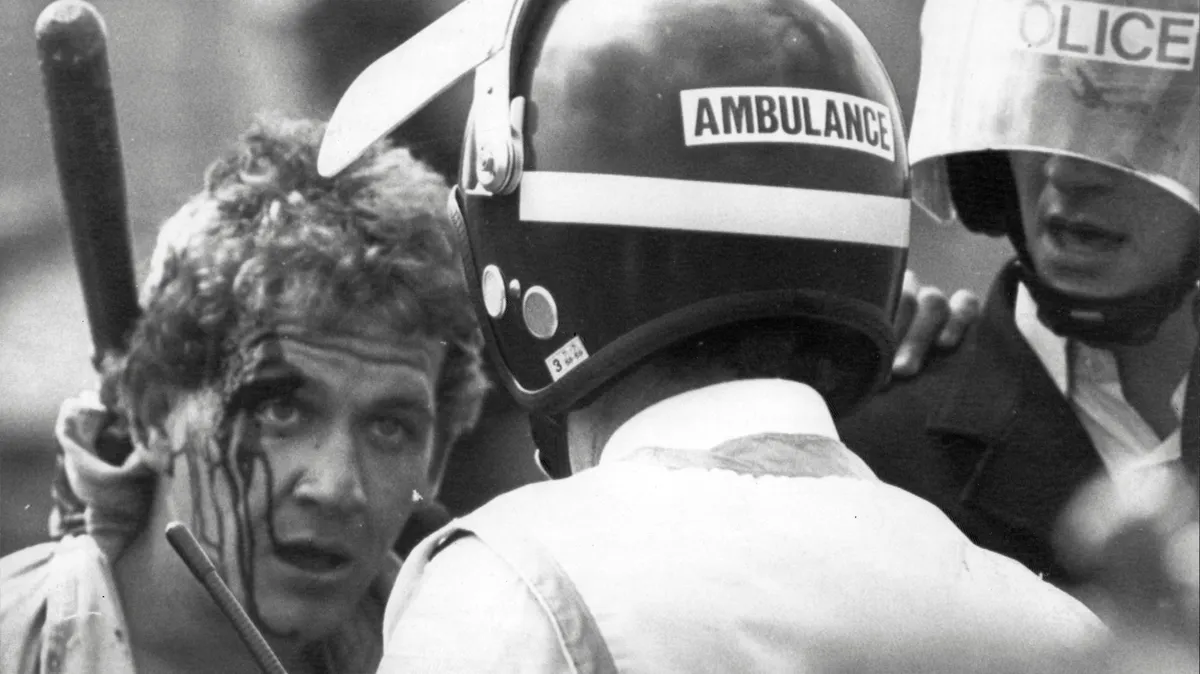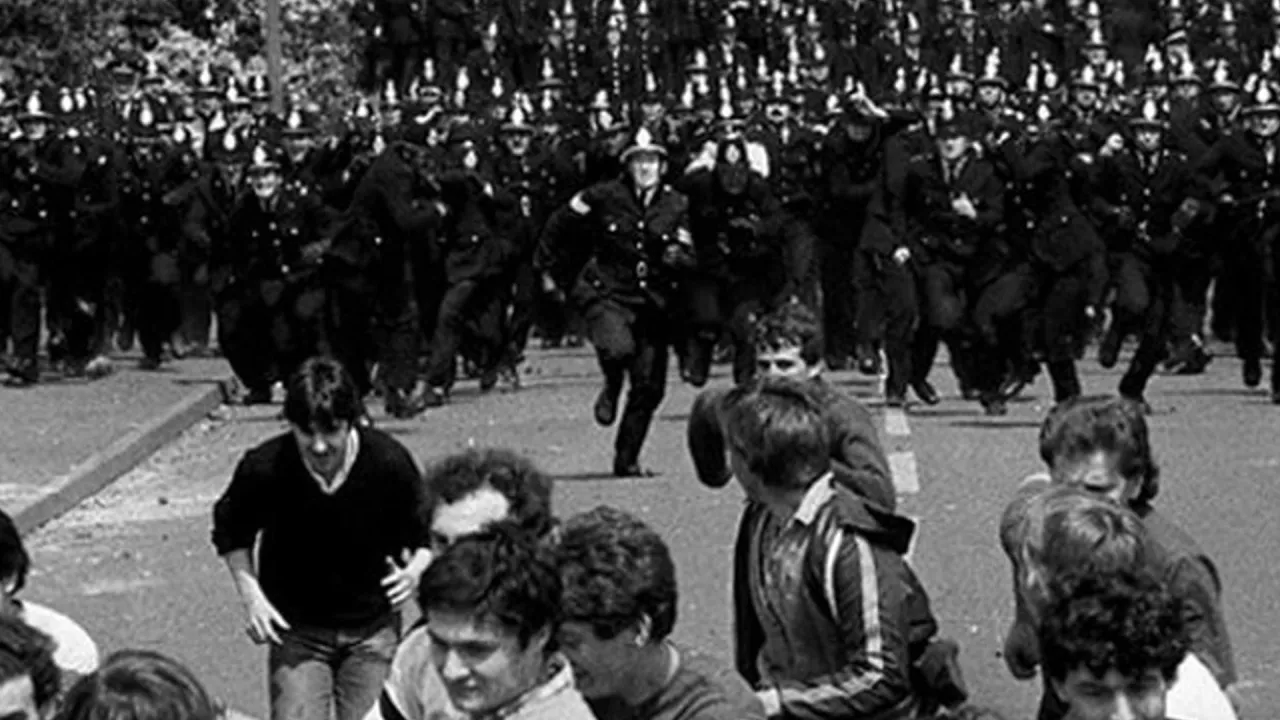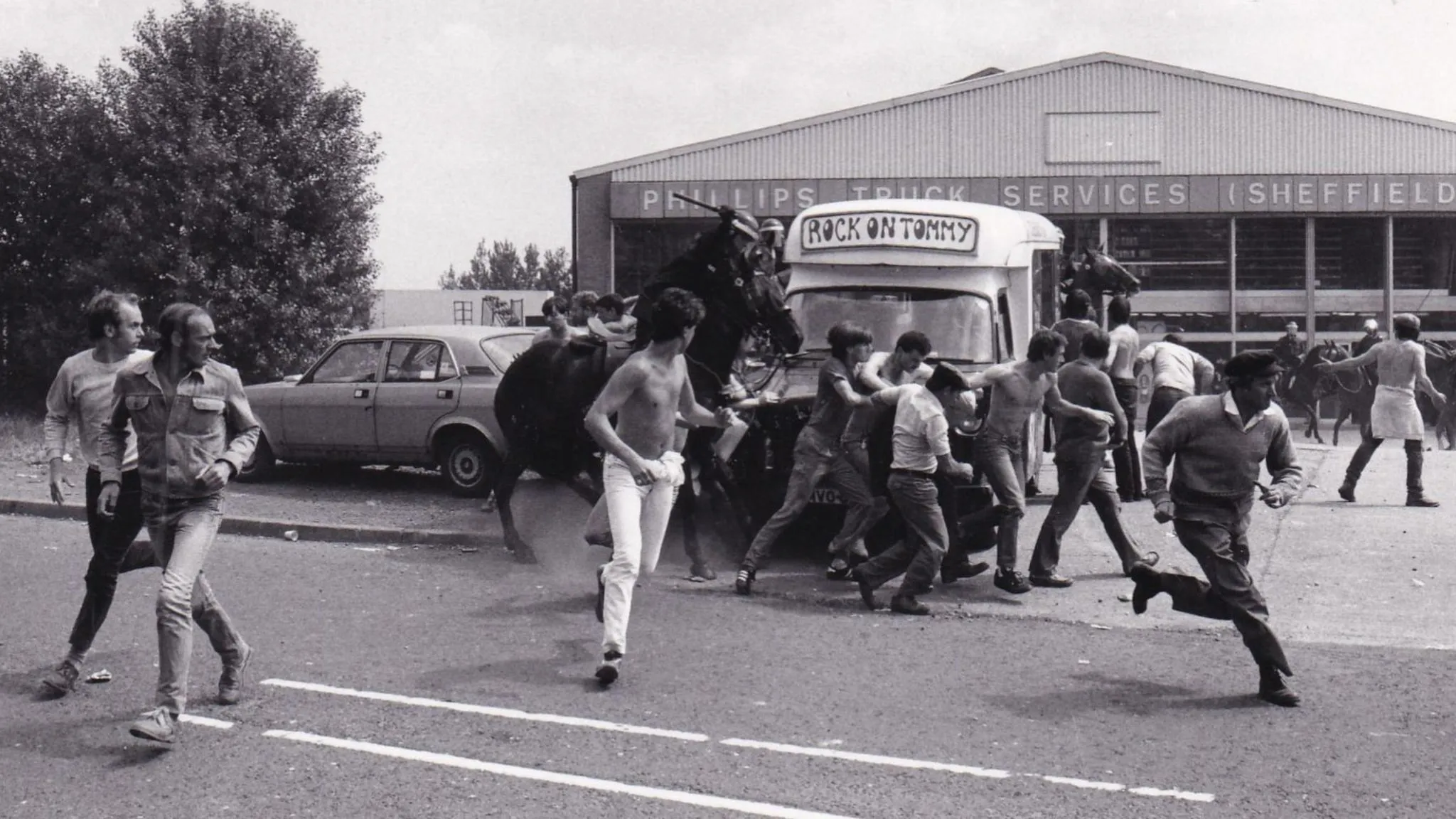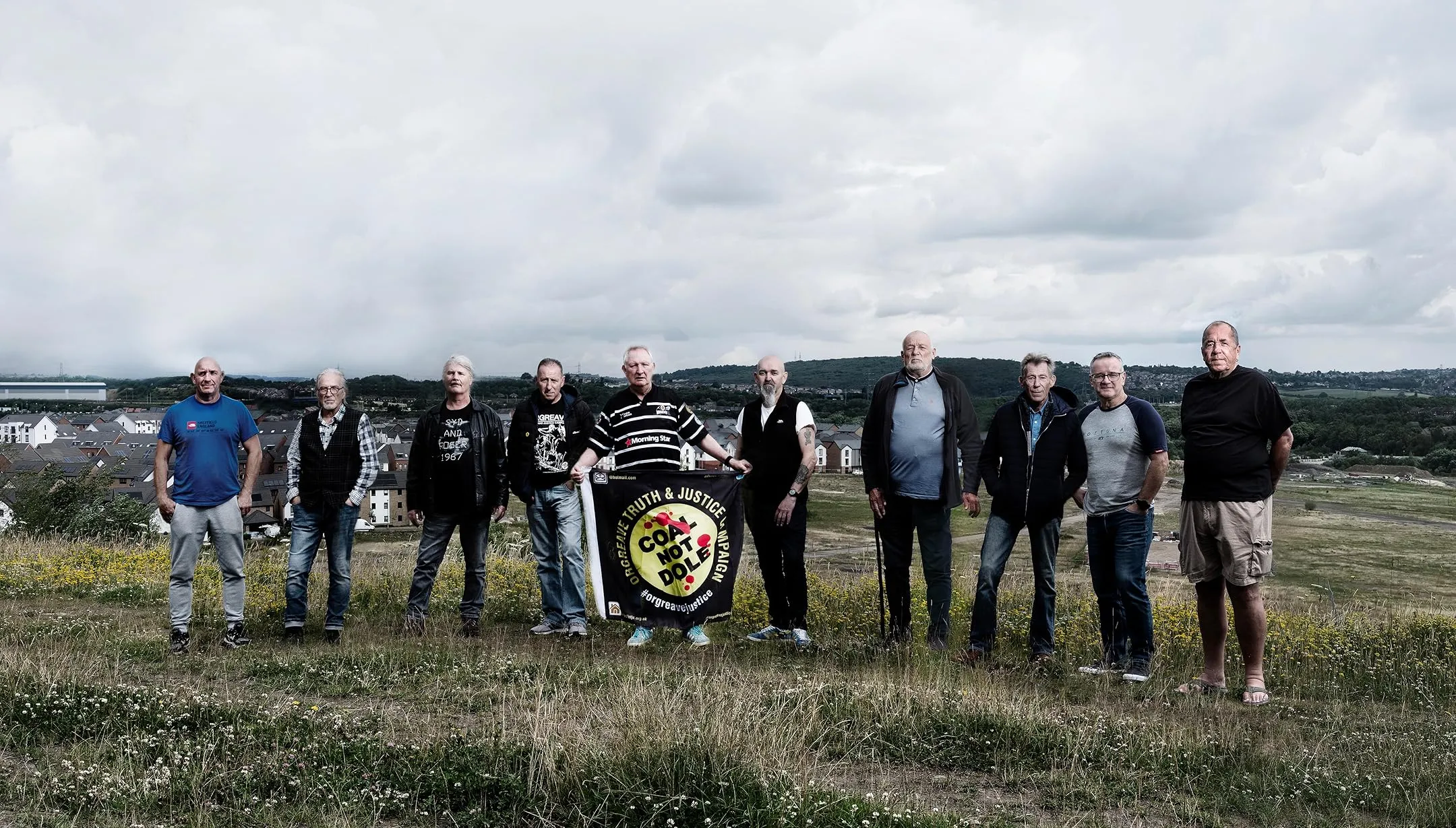The Strike documents an intense period in Britain’s industrial past. In 1984-85, miners went on strike, resisting planned pit closures by Margaret Thatcher’s Conservative government. This threatened not just jobs but whole communities’ lives. Director Daniel Gordon’s film focuses on pivotal events at the Orgreave coking plant, where thousands of picketing miners faced off against massed police. Amid raised tensions, what happened that day would prove hugely impactful.
Gordon constructs his story through both archive footage and new interviews. We hear miners’ first-hand accounts of their experiences both above and below ground. Their remarks highlight the personal stakes in this iconic labor dispute. Elsewhere, police also reflect on participating in an operation that later faced serious accusations. Through weaving together such contrasting perspectives, Gordon presents a rounded analysis.
The review will now consider key elements of the Strike’s narrative in turn. We’ll look at contextual backgrounds, what drove the conflict’s escalation, and how its bitter legacy still lingers today. Overall, the film offers compelling lessons about a society undergoing seismic change and the human toll of challenging political will.
Origins of Opposition
The clashes of 1984 had been building over a long period. Miners previously mobilized in ’72 and ’74 when faced with closures under Heath’s government. Both times they took effective action to stop the job losses. However, as the Strike shows, no lessons were learned in some quarters.
Margaret Thatcher took office determined to curb Union power and reshape Britain’s economy. Her beliefs placed little value on mining as heavy industry declined. Soon enough, dozens of pits were targeted for closure without consultation. Entire communities saw their foundation flagging with no alternative presented. Understandably, anger grew amongst many whose families had spent generations underground.
Meanwhile, memories of past victories spurred miners to resist once more. Led by the charismatic Arthur Scargill, tens of thousands again downed tools in defiance of the cuts. Their cause gained wide public sympathy at first. Yet Thatcher proved a formidable opponent too, learning from past missteps. She deployed policemen in unprecedented numbers, including paramilitary-trained groups, to counter picket lines with force.
So when miners gathered at Orgreave to blockade coke deliveries, a showdown loomed. Unbeknownst to many that morning, a vast police operation was already preparing its response. Gordon’s film proves vital in unpacking how events there took on such an explosive and violent tone, with deep lasting consequences. From these flashpoints, a year-long battle of wills was joined between a defiant community and a government with very different plans for Britain’s future.
Brutal Confrontation
Come the 18th of June, tensions were at boiling point. That morning, thousands of picketing miners rolled out to Barnsley amid anticipation of a showdown. Few could have fathomed the scale of the police operation amassing nearby. Gordon reconstructs how close to 6,000 officers were marshaled with military precision. Mounted divisions, canine units, and ranks equipped with long shields were assembled, far outstripping the miners in numbers and gear.
The pickets’ goal was blocking coke deliveries to fuel Scunthorpe steel mill. Archives unveil their surprisingly relaxed entry to the plant, no sign then of the mayhem about to erupt. All changed within hours as the police force swept in. Mounted cops and snatch squads charged without warning, sending miners scattering. Yet these were outnumbered men with only the clothes on their backs. One described the police as resembling “medieval knights,” tooled for maximum impact.
Chaos engulfed the site. Old news clips show police drums thundering while baton charges battered anyone in their path. Picket testimonies bring the visceral fear flooding back, retelling frantic efforts simply to avoid being trampled. Unlike police claims, minimal provocation seemed to motivate the aggression unleashed that blistering summer’s day. Bodies piled up as arrests stacked up, many on dubious charges soon evaporating in court.
With depth and care, Gordon weaves together miners’ personal memories of enduring assaults that day. Their raw emotion shines through, even decades on. Also heard are policing perspectives, though these acknowledge fabrication of statements later. Together, these sources paint a dark picture of preplanned suppression of dissent, with long-term scars left on all involved in Britain’s “last civil conflict.”.
Raising Their Voices
Gordon’s direction ensures those central to his story have their say. We hear directly from miners who braved Orgreave’s chaos and its wider impacts. Locating interviewees four decades on can’t have been easy, but their memories remain searingly vivid. Patiently, Gordon gives space for difficult emotions stirred by revisiting trauma. More than soundbites, their perspectives feel authentically human.
Archival materials similarly play a pivotal role. Grainy news reports place us amid the pitched clashes, though their distortions are laid bare. Static photos capture haunting, composed scenes at odds with turmoil underway. Skillfully, Gordon interweaves these artifacts around testimony. Facts speak through action frozen in time as voices paint atmospheres no camera captured.
Throughout, a carefully selected non-intrusive score enhances rather than drives the material. Gordon trusts his sources to carry viewers through Strike’s extensive runtime. Shots linger where others may have rushed on. Real people’s natural rhythms of speech prevail over a need to constantly propel the plot.
By committing to this measured approach, Gordon has ultimately let 1984’s unsung participants affirm their own experiences unrestrained. Bereft of objective mediation, their moving personal histories shine forth openly. In thus restoring ownership of long-buried narratives to miners and their families, Strike achieves its most meaningful victory.
Unearthing the Truth
Gordon leaves no stone unturned in his examination. Archive finds and records released under FOI reveal the extent of political meddling that fateful day. A “colonial policing” blueprint was drawn up in secret. Thatcher had no qualms directing police action, still smarting from miners’ past wins.
When charges saw 95 arrested, it seemed a victory. But the film shows how evidence was intentionally twisted. Police testified to phantom violence, yet film proves their aggression. In court, concocted statements unraveled. Without foundation, prosecutions crumbled—though not before lives were ruined.
Miners recall the bitterness when defeat came. Towns split as “scabs” faced permanent scorn. With collieries closed, poverty spread through communities previously largely untouched. How Gordon allows these scars to surface is moving. His patience lets raw sentiments convey lasting damage better than rushed words.
Yet darker currents emerged too. Thatcher hailed victory in a “war against an internal enemy.” Such talk incited troubling echoes, as dissent was demonized. Parallels emerge with today’s debates on the right to protest. Strike ensures Orgreave’s true story can’t be obscured or re-spun, and its impact on individuals can finally be honored. In charting suppressed truths so meticulously, Gordon has performed a public service history that may yet be acknowledged.
Scars That Never Healed
It’s evident some wounds still ache four decades on. Miners opening up about their Orgreave experiences cannot hold back tears. For these men, the cinematic process seems as much cathartic as historical. Gordon gently coaxes recollections from deep within, showing respect for private griefs borne so long in silence.
Divisions torn through tight-knit locales persisted years after victory and defeat were declared. Allegiances split not just between workers but spilt families down the center. One recalls his union father disowning him for crossing pickets. Such painful rifts left legacy resentments. Even now, some refuse reconciliation with those labeled “scabs.”.
Yet many also nursed inner conflicts. Regrets echo from those too fearful to stand up beside comrades. Gordon presents psychological scars as equally tragic as physical ones. His gentle direction draws not just facts but feelings to the fore, providing a platform these testimonies have long been denied. Their emotional candor makes Strike’s human story all the more unforgettable.
While pain still clings to individuals, others profit from propagating falsehoods. The film lays bare how the Thatcher regime and pliant press stoked public opinion. To this day, alternative narratives fight for mainstream recognition. Perhaps Strike can play part in finally setting the historical record straight and honoring mining communities’ stories in their full complexity.
Refocusing on the Truth
Four decades on, Gordon has granted mining communities a deserved public hearing. His documentary pairs emotive personal testimony with thorough analysis of underlying realities obscured by propaganda at the time. While some effects can never fully heal, Strike works to remedy broader damages wrought through distorted histories.
Remarkably, key questions around Orgreave remain unanswered due to denied scrutiny. In quietly signposting ongoing restrictions on public knowledge, Gordon subtly calls the viewer towards continued advocacy. His diligent unpacking of deceptions finally illuminates miners’ experience for what it was—a struggle against calculated disruption of livelihoods and solidarity.
Though the strike’s conclusion brought solitary fates, Gordon’s film reconnects dispersed voices in an act of empathy. By prioritizing both individual and social impacts, he has established Strike as an informative and empathetic watch. It compellingly highlights why Orgreave deserves a fresh examination to comprehensively address Labour’s long-standing concerns. Through craft and care, Gordon has oriented us towards appreciating hidden dimensions of Britain’s past with new nuance and care.
The Review
Strike: An Uncivil War
Daniel Gordon's Strike: An Uncivil War is a masterful piece of documentary filmmaking that serves both as a comprehensive historical record and a profoundly moving tribute. Gordon applies meticulous research and thoughtful direction to illuminate suppressed personal stories against the backdrop of momentous labor disputes. While reopening old wounds, the film also initiates a long-overdue public reconciliation. In delivering emotional truth and analytical rigor with equal care, Strike attains its goal of ensuring those impacted by 1984's tumult can finally see their truthfully honored. It deserves recognition as an enduring corrective to skewed narratives that have held sway for too long.
PROS
- Thoughtful and sensitive direction that gives full voice to interview subjects
- Meticulous research illuminating political manipulation and forgotten details
- Establishes an even-handed perspective through contrasting miner and police testimony.
- Archival materials and photos powerfully augment personal accounts.
- Understated score complements rather than directs emotive stories.
- Fills an important gap in mainstream history by lifting the reality of mining communities.
CONS
- Lengthy runtime risks losing some viewers amid the film's thoroughness





















































Discussion about this post